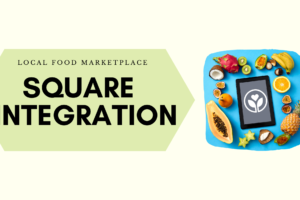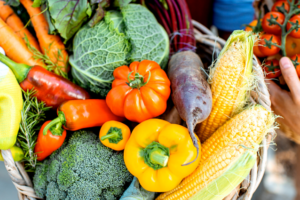

Photo courtesy of Zaklan Heritage Farm
Nestled in the middle of suburban British Columbia, you can find Gemma and Doug on Zaklan Heritage Farm: a 90 year old mixed vegetable and egg farm serving Surrey and their urban neighbors. Now in their 7th year of production, Zaklan Heritage Farm focuses on selling directly to restaurants and a 60 member CSA, using Local Food Marketplace to power their back-end operations.
We recently spent time speaking with Gemma about their farm and how an unexpected change in customer demand brought them to LFM. Read on to find out more!
-Hi, Gemma! Could you tell us a little bit more about yourself and the farm?
Sure! Zaklan Heritage Farm is located in Surrey, BC, about a 30 minute drive from Vancouver. We are an acre and a half intensive production farm located in the suburbs, surrounded by townhouses and residential buildings! The farm is run by myself and my partner, Doug Zaklan, on his family’s farm land, which has been in the family since 1924. We just finished our sixth going on seventh year farming here, and this is one of the reasons we get to farm so close to the city.
Doug’s great Uncle George Zaklan, who was born on the farm, and his wife, Evelyn, still live on the property. They are both now in their 80s, and it was through George’s sheer determination that the land still exists. Personal land ethic and politics have kept the land in the family after all of these years.
-Where do you market and sell your products?
Last year was the first year we solely focused on restaurant sales, and we maintained our 60 member CSA for our local community. It wasn’t always that way! When we started we did all sorts of things: on-farm markets, off-farm markets, CSA – anything we could do to sell products! We kind of did that for a few years, realized the on-farm market wasn’t working, so we started working with more restaurants and looking for a distributor. That’s what got us into restaurants, and at the same time we were still doing our CSA and farmers markets.
Then, in the March of that year, the distributor went out of business, and we were stuck to make a big push of revenue. At that point we decided to venture into restaurants alone, and that was about 3 years ago.
For about two years we were doing farmers markets, a CSA, and restaurants. At the end of the second year of doing restaurants, we thought farmers markets were great. But, for us, we weren’t seeing growth at the farmers market and it wasn’t giving us much joy on a weekly basis. It was stressful, and we weren’t sure of the predetermined amounts.
Focusing solely on restaurants and our CSA, we thought we were going to be busy. We ended up being really, really, really busy and a bit overwhelmed by the demand! Which is great, but we were doing 3-4 hours of data entry a week, following up with chefs, and it got a bit crazy.
-What brought you to Local Food Marketplace and becoming a customer of ours?
We knew that LFM was out there, because other farms we know were using the platform and it seemed like what we were looking for. Also, chefs wanted photos of our products, so using our way before LFM, chefs had to have google photos open while looking at their fresh sheets. That wasn’t really working for us or the chefs.
At first, Doug and I kind of looked into LFM briefly, and thought maybe LFM was just a bit more than we wanted to spend or needed at the time. We kind of carried on last season, and by August, I was spending at least 1 hour doing the fresh sheet and at least 2 hours the night before doing the spreadsheet. As the season went on, I was entering hours of data in the spreadsheets every week and ended up nipping things, which made it problematic for customers. I’d be invoicing before deliveries went out, so I’d be frantically sending invoices to 30 restaurants before morning deliveries. It got really stressful.
That’s when I reached out LFM! Amy was great at doing an intro call and figuring out what we needed and how it would work for us. She didn’t try and sell us something we didn’t need or something that wasn’t helpful for our farm. We transitioned in the end of September to give it a try at the end of 2018.
-What do you like most about LFM and working with us?
We started in the slower part of our season, which was really nice as we transitioned 30 customers over to one platform. I think that I found it’s been way easier for compiling orders – that’s really nice. We work with another farm, too, so it’s nice for having an efficient way for their orders to get compiled, rather than me having to manually enter the orders. The invoicing function has been the BEST! The automated invoices to customers and the updated orders are really the best.
Although, I think what I like most about LFM is that it’s constantly under development. It seems like peoples’ comments are actually heard, and that LFM takes it seriously.
-What are you looking forward to this upcoming growing season?
I’m excited to be using LFM for the upcoming season! We are running our CSA through the platform this year, so I am super excited to have it localized all in one spot. It will be great! It’s just really nice to have the technology available.
-What would you say to someone interested in pursuing LFM?
Someone asked me yesterday about it! I think it definitely makes a big difference if you’re doing more than an hour of invoicing or more than two hours of spreadsheet work a week. It’s really all about what you like to do and where you value your time. I’m a big believer of minimizing the things you don’t like to do and maximizing the things you like to do.
LFM has allowed me to increase account tracking, invoicing, adding more customers, and things like that. For our scale, we are the tip of the iceberg of what LFM can do. It has really amazing connections and capabilities, and we are just so excited.
Register for a Demo!


